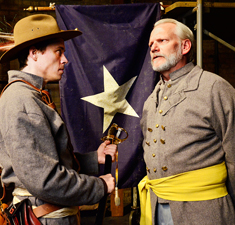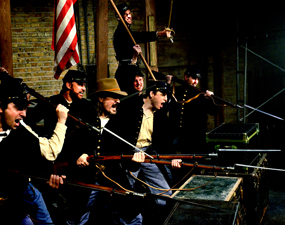From Chicago Sun-Times
War truths march on in engrossing ‘Killer Angels’
September 26, 2013
By Hedy Weiss
HIGHLY RECOMMENDED
Listen carefully to the Troubadour who opens Lifeline Theatre’s hugely engrossing production, “The Killer Angels.”
Strumming a guitar, he sings “The Battle Hymn of the Republic,” that quasi-Biblical song that became a Union anthem during the American Civil War, and contained this line: “As He died to make men holy, let us die to make men free.” There is something decidedly less than triumphal about the balladeer’s rendition. Determined, weary, rueful, anguished, broken? Absolutely. Victorious? Hardly. You sense the brokenness, both physical and spiritual, that comes most particularly with a civil war.
Karen Tarjan’s superb stage adaptation of Michael Shaara’s 1975 Pulitzer Prize-winning novel about the Battle of Gettysburg was first staged by Lifeline in 2004. It has been remounted this season to commemorate the 150th anniversary of the conflagration — the battle that, over the course of its four days (June 30 to July 3, 1863), not only resulted in the largest number of casualties of the war, but also is widely seen as its turning point. And on all counts this production is a stunner.
The classic adage about war is that is comprised of “long periods of boredom punctuated by moments of sheer terror.” There is nothing at all boring about “The Killer Angels,” but it swings convincingly between those two extremes. And it has been ingeniously directed by Matt Miller and designed by Alan Donahue, so that a collection of rudimentary set pieces and props (scaffolding, a few wooden platforms, steamer trunks, some blankets and rifles) can be assembled and reassembled to suggest a slew of locations and battlefield perspectives.
Leading the Confederate forces is the aging Gen. Robert E. Lee (Don Bender, in a wonderfully measured portrayal of a complex man), who in many ways seems to have lost his tactical touch but not his stubbornness. Lee makes several crucially wrong decisions despite the advice of his colleague, Lt. Gen. James Longstreet (Tom Hickey, excellent as the man who respects Lee yet sees the error of his decisions).
On the Union side there is Col. Chamberlain (a winningly poetic Michael McKeough), the handsome, sensitive intellectual from Maine ordered to hold the Union line at any cost. He does so, heroically, suffering many casualties in the process, including a serious wound to his leg. (Chamberlain’s conversations with his younger brother — played by the appealing Zach Livingston — supply lovely interludes.)
Although there are only 10 actors on the Lifeline stage they magically manage to conjure thousands, with Steve O’Connell as a very funny, gung-ho Major Gen. Pickett and Sean Sinitski as Ewell, on the Confederate flank; Chris Hainsford as a Union general; Niall McGinty most memorable playing officers on both sides; Joe Flynn as an expertly shrewd spy; and throughout it all (with excellent music direction by Mike Przygoda), Matt Fletcher as the wonderful Troubadour who suggests the determination, fear and tragic undertow of this nation-altering war.
From the Chicago Reader
September 16, 2013
By Albert Williams
RECOMMENDED
Lifeline Theatre’s adaptation of Michael Shaara’s Pulitzer Prize-winning 1974 novel (also the source of the 1993 movie Gettysburg) chronicles the Battle of Gettysburg from the perspective of Union and Confederate soldiers as well as a British observer. The bloody conflict took place on the eve of the Fourth of July, as each side fought for its own ideal of freedom — southerners against what they saw as federal tyranny, northerners to end slavery. A fine all-male cast of ten portray multiple roles, with Matt Fletcher making an especially strong impression as the folksinger who narrates the action. It’s sometimes hard to follow the military tactics and logistics described in Karen Tarjan’s script, but the story’s emotional content is clear and moving. And Matt Miller’s staging packs a theatrical punch with the aid of vivid design by Alan Donahue (set), Julian Pike (lights), Elizabeth Wislar (costumes), and Stephen Ptacek (sound) as well as evocative 19th-century songs.
From Time Out Chicago
Lifeline revisits Karen Tarjan’s smart, measured adaptation of Michael Shaara’s Gettysburg novel.
September 16, 2013
By Gwen Purdom
FOUR STARS
War-wearied General Robert E. Lee is roused in the middle of the night to analyze the Union troops’ movements with his fellow officers in Lifeline Theatre’s The Killer Angels. The men’s strategizing is set against a quiet din of crickets chirping and distant guitar strumming by soldiers on the other side of camp. Cigar smoke and tentside fires form a thick haze in the air. These understated sensory choices aren’t groundbreaking, but they’re just a few of the ways the smart production uses subtle suggestion to animate a stark, intimate space and transform it into the epic scenes of one of America’s most storied conflicts.
Adapted for the stage by Karen Tarjan, Michael Shaara’s 1974 Pulitzer Prize-winning novel about the Battle of Gettysburg (which was also turned into a 1993 movie) takes some historical liberties but caught the imaginations of a Civil War-obsessed public by incorporating real people and largely real events from those three July days in 1863. There are a lot of bearded men in uniform to keep straight in the play, but the plot centers on Confederate commander Lee (Don Bender), his second-in-command Gen. James Longstreet (Tom Hickey) and the Union’s charismatic Col. Joshua Lawrence Chamberlain (Michael McKeogh), among more than a dozen other historical figures portrayed by a cast of ten playing multiple parts. Some knowledge of the war and the battle’s context is helpful, but not essential. The actors bring an authentic humanity to their roles — McKeogh and Bender especially — which makes the story engaging, if potentially hard to keep up with if you don’t know your battlefield history.
There’s not a lot of backstory or the deep character development some other Civil War stories include. Wives, sweethearts and children are mentioned only in passing, or in the familiar, haunting ballads played between scenes by a narrating troubadour (Matt Fletcher). This piece is about war and the game-changing battle itself — both its tactical planning (or lack thereof) and its jarring, inherent drama. It would be easy with such legendary material as the fighting at Little Round Top and Pickett’s ill-fated Charge to go too big or too hard, but director Matt Miller’s interpretation is restrained and thoughtful. When you’re talking about tens of thousands of people killing each other in the hills and orchards of Pennsylvania with the fate of a nation at stake, a little goes a long way.
From Windy City Times
September 24, 2013
By Jonathan Abarbanel
Last July was the 150th anniversary of the Battle of Gettysburg, a horrendous three-day slaughter that turned the tide of the Civil War. To mark the occasion, Lifeline offers a new production of The Killer Angels, first presented in 2004, adapted from the battle-inspired novel by Michael Shaara. The novel draws most of its important names and events from history, but Shaara (and stage adapter Karen Tarjan) amplifies well-known facts and personalities by writing between the lines of history to reveal emotions, motivations, egos and insecurities.
Ken Burns achieved the same effect in his multi-part film The Civil War by telling use of period music and sympathetic voices speaking words from the letters and diaries of officers and common soldiers alike. Burns made the terrors and maneuverings of war almost poetic, and if this production has a fault it’s that it duplicates Burns’ tone. I was aware of this as Channel 11 recently rebroadcast The Civil War and I happened to see the Gettysburg episode.
But the stage adaptation does something more: threaded through the narrative are conversations and private ruminations that frame the varied and often ambiguous arguments over which the war was waged in the first place. Was institutionalized racism the primary issue? Or equality and justice? Or was it the rights and powers of the states vs. those of the Federal government? Or was the brawl about whether or not the USA should have a natural aristocracy of wealth and genealogy? All of these points are raised in the production without attempting an answer.
The 10 actors to a man render heartfelt and understated performances under director Matt Miller. Most play multiple characters on both sides of the battle lines, deftly switching from blue coats to grey coast as required. When death overtakes a soldier, he sheds his coat and drops it on the floor. Pickett’s Charge, the famous third-day disaster, ends with a jumble of coats center stage. Veteran Don Bender and newcomer Michael McKeogh set the acting standard. As Robert E. Lee, Bender conveys great depth and integrity with minimal showiness.
As Col. Chamberlain, the unexpected hero who held Little Round Top for the Union. Michael McKeogh conveys slightly-bemused empathy and grace under fire. But the hero of the play, or at least clearly its moral center, is Confederate Gen. Longstreet, who must send his men on a suicide mission due to the ineptitude of others. Tom Hickey plays Longstreet with passionate dignity and just a touch of swagger. As in the Burns film, music seasons The Killer Angels to great effect, with Matt Fletcher singing songs of North and South which help make palpable the astonishing folly and heartfelt, if often-misplaced, idealism of war.
From Chicago Stage Standard
September 17, 2013
By Angela Allyn
War is messy, unpredictable, tragic by definition. Men are fallible, fragile, at turns brilliant and moronic. People can be swept along by ideas, willing to defend them unto death. The media is full of such things: Egypt, Syria. Just last week our president mulled entering into yet another messy conflict.
And so we head to the theater, a medium able to illuminate and illustrate such complicated existential realities in a way that nothing else can. Since the dawn of civilization and the Iliad, we humans have told war stories. Over at Lifeline Theatre, tucked away next to the CTA tracks in Chicago’s Rogers Park, there is a war story unfolding in a raw, exposed brick surface box of an intimate theater. The space is transformed, via two racks of uniforms and a scaffold, into the sweeping field of battle at Gettysburg, on its one hundred and fiftieth anniversary. This story of the Civil War is a story worth retelling over and over, and Lifeline tells it well in a remounted production under the able direction of Matt Miller who fittingly chooses to use the same ensemble to represent both sides in the conflict: while confusing at first, it becomes a chilling metaphor because there was so little different in the back stories of the combatants. The constant choreographic donning, dropping and switching of the uniforms is slightly distracting but effective.
Troubadour Matt Fletcher keeps the story moving with haunting renditions of what seem like clichéd tunes that we all know. He also provides the battle details we need to make sense of the action. Don Bender as General Lee is sad and heroic, honorable and doomed. Tom Hickey’s Longstreet is loyal and prescient. Michael McKeough’s Chamberlain is a revelation — but there isn’t a weak link in this entire cast. This ensemble brings to life the fatigue of General Lee, the bravado of the boys from Maine, the deep misgivings of the southern generals, and the horror of a suicide mission. This is a show that demands tour de force physicality and characterization and split second morphs from Northerner to Southerner complete with accents (props to dialect coach Elise Kauzlaric). This all male show makes me wish a writer would tell the woman’s side of a story where the battle lines rip apart families and leave a generation missing limbs. In this play, each character is willing to die, not for bread and water, but for an esoteric ideal: be it land, rights of black men they have never met, for tradition or for honor—whatever that is.
As the twenty odd characters in this tragedy assemble and move through the three July days of the epic battle, I see some tiny flaws, but most are born of a script trying too hard to distill a complex and shifting dynamic with so many characters. Adapter Karen Tarjan had a lot less time than Ken Burns to bring Michael Shaara’s Pulitzer Prize winning novel to life. And there’s no way around the fact that you have to know a little bit about the Battle of Gettysburg and its place in the Civil War, and our nation’s history to have this story make sense. Luckily, I am a history geek. If you aren’t and even if you are, you might want to peruse the lobby materials to clarify. They have a wonderful visual map of the battle.
Stand outs include the sound design, by Stephen Ptacek, with stirring battle noises contrasted with crickets in the late night lulls. The music, directed by Mike Przygoda, is spare and lovely. And the rendition of the Battle Hymn of the Republic sent shivers down my spine. Never was that tune more apt for moving the plot forward. Nowhere has it made more sense.
You cannot understand the time in which we find ourselves, or what is going on in this nation (from Trayvon Martin to whether we do anything about Syria) without at least a cursory understanding of the Civil War and what happened at Gettysburg. Fifty thousand men lost their lives in those three days and we do well to hear their stories. The Killer Angels is a compelling, visceral way to experience a version of this foundation story of our nation’s childhood, when our innocence as a culture was lost. And even if you hate history, this is a useful way to spend an evening because we live in a nation that, for better or worse, still feels drawn to send its people to fight, kill and die for that ever elusive idea: Freedom.
From Chicago Theater Beat
Captivating adaptation embodies Civil War’s true human struggles
October 3, 2013
By Katy Walsh
A textbook tells the facts. A movie showcases the action. This play embodies the true human struggle of the Civil War. It’s like a reenactment, but instead of reliving glorified battlefield maneuvers, it focuses on the men making the historical decisions. This insider’s perspective shows the conflict, the doubt, and the hope of a nation divided over independence.
Pulitzer Prize-winning author Michael Shaara chronicled the battles at Gettysburg. His story recounts the pivotal time period from both the Confederate and Union sides. The history lesson manifests into a very human tribute under the masterful collaborative efforts of Adaptor Karen Tarjan and Director Matt Miller. Right from the start, the show captivates. Playing a minstrel narrator, Matt Fletcher (Troubadour) appears on stage and starts to sing “The Battle Hymn of the Republic.” He is joined by the talented male ensemble. Their voices form a strong chorus. The haunting sound is bittersweet. I already have a lump in my throat at the sense of solidarity.
At the beginning the men are all dressed uniformly in white shirts. This scene becomes powerfully symbolic. Throughout the show, the actors will put on blue or grey coats to play for both sides. It’s an impressive feat as these guys continually change coats, accents and personalities. Among the dual roles, Don Bender skillfully goes back and forth from a formidable Lee to a cantankerous Union soldier. The entire ensemble is superb. The gritty reality of war is apparent in the human vulnerability and uncertainty. The brooding Tom Hickey (Longstreet) clashing with the boisterous Steve O’Connell (Pickett) makes it real. The judicious Michael McKeough (Chamberlain), trying to lead while protecting the rascally Zach Livingston (Tom), engages with brotherly tenderness.
Under Miller’s direction, the scene transitions from North to South are well-paced and smooth. Miller uses a variety of techniques to keep us riveted to the story. Death is shown by a coat removal. And multiple fatalities are illustrated in a synchronized march of coats. A battle scene becomes a spectacle at the hands of Designers Julian Pike (lights) and Stephen Ptacek (sound).
Throughout the show, the charismatic Fletcher appears as our tour guide. He establishes timing and tone. In one scene, Fletcher poignantly counts down minutes. In multiple scenes, he sings and strums upbeat or downtrodden tunes. His presence is mesmerizing.
I’m not a Civil War buff. During the show, I could only vaguely recall some of my American history from my school days. Still, I was thoroughly engrossed by The Killer Angels. It’s excellent! The orchestration and execution of this tale is one of Lifeline’s highest achievements.
From Stage and Cinema
KILLER THEATER
September 17, 2013
By Lawrence Bommer
Recreating in part the pivotal Civil War battle fought 150 years ago this July, Lifeline Theatre’s labor of hate, powerfully staged by Matt Miller, is as cinematic as theater can get in three dimensions. Commissioned for the company, Karen Tarjan’s 2004 adaptation of Michael Shaara’s much-praised novel (made into the 1993 Gettysburg) dynamically delivers three days of all-consuming combat — lost opportunities, failed strategies, brilliant tactics, reversals and upheavals. Above all, we hear, feel, see and endure the too-human factors of fear and fury as flesh and blood meet cannonballs, bayonets, and bullets en masse.
The Killer Angels works well and hard to humanize the carnage that sprawled over a Pennsylvania countryside in high summer as General Meade’s Union troops accidentally blundered into Gen. Robert E. Lee’s Rebel horde. (When a bunch of Confederates seeking shoes in the town of Gettysburg met their enemy, an accident became a holocaust from July 1-3, 1863.) Seldom has the eloquence of energy been so palpable: This swirling Lifeline stage pulsates and detonates with its revolving scaffolding, portmanteaux that double as barricades, and busy wardrobe of rapidly changed costumes in blue and gray.
As the Troubadour, Matt Fletcher delivers period classics from both sides (such as the always glorious “Battle Hymn of the Republic” and “Just Before the Battle, Mother”) that expose the emotions that warfare tries to conceal. The other noises — sound designer Stephen Ptacek’s ferocious and deafening cannon fire and whizzing grape shot — leave next to nothing to the imagination.
Along the bloody way we meet two handsome and valiant survivors, fighting brothers from Maine (Michael McKeough and Zach Livingston, the former playing a gentle Bowdoin professor) who anchor their valor in a strong conviction against the evils of slavery and the expendability of those who defend it. Representing the disloyal opposition, Joe Flynn plays a very British Coldstream officer who, observing the mayhem, praises the South for its old-school adherence to land and tradition when the North represents too much unprocessed change. (This in part explains how they lost their Empire.) The 10-member ensemble makes an unforgettable band of brothers.
So much at Gettysburg was a question of luck and location. Besides the “homefield advantage” of fighting on your own turf, the Union secured the advantage of commanding heights like Little Round Top, Culp’s Hill and Cemetery Ridge. Lee’s smaller forces were rapidly depleted in gallant but doomed attempts (like Pickett’s Charge, here strangely without the famous rebel yell) to dislodge the “blueberries” and their deadly artillery.
Mistakes were measured in blood: Sickle’s insubordinate withdrawal of his men from the Union center, Ewell’s failure to capture the advantage of high ground, the abject failure of J.E.B. Stuart to monitor Meade’s movements and warn Lee about the encroaching Yankees.
But, like the brothers who die for different sides, it’s the profiles in courage amid the “fog of battle” that lift these two hours into a kind of theatrical glory. Don Bender’s Lee incarnates weathered wisdom, implacable will and, ultimately, toxic remorse over the loss of a war as much as this panic in Pennsylvania. Among many memorable hit-and-run depictions are Tom Hickey’s cautious Longstreet (sadly vindicated by the secessionists’ defeat), Steve O’Connell’s over-eager George Pickett and noble Reynolds, and Flynn as an actor turned spy who provides the graycoats with priceless reconnaissance. Then there are the coordinated attacks, with the soldiers’ deaths indicated, not by blood bags exploding in their costumes, but by the simple removal of their uniforms as they return to the rolling rack to assume new ones.
You are there and suddenly Shakespeare’s history plays get reinvented. After all, there’s not one emotion that erupted on Gettysburg that wasn’t “rehearsed” at Agincourt, Tewkesbury and Bosworth Field.
From Splash Magazine
Lifeline’s “The Killer Angels” Review — A Tale of War Well-Told
September 30, 2013
By Amy Munice
What can a small theater do to tell a tale better than big budget movies or novels?
Lifeline’s “The Killer Angels” gives a good answer to that question, showing how fine acting up close and creativity with a modicum of props can make a story come alive in ways that movies, TV or even big theaters cannot.
“The Killer Angels” tells the tale of the decisive Battle of Gettysburg during the Civil War. It is a treasure both for history buffs and those learning of these events for the first time.
According to the program notes the author, Michael Shaara, had his novel rejected by publishers 15 times, with its eventual publication floundering as a commercial flop. Amazingly, it then won the Pulitzer Prize for Fiction the next year and later became a Hollywood movie, Gettysburg.
In the small Lifeline space ten men doing quick changes from gray to blue create 22+ roles and alternately speak to the events from multiple points of view — North and South, Generals, colonels, lieutenants and even deserters. We meet a General Lee (Don Bender) who never had slaves, was devoted to his beloved Virginia, and makes decisions readily that he knows will mean great numbers of dead among his troops. We see the frustration of his subordinates who think more strategically, particularly Longstreet (Tom Hickey).
We develop a deep bond with a gentleman soldier from the North who in pre-war was a professor and who has a deep-seated loathing of slavery, Chamberlain (Michael McKeough).
We learn of West Point grads on both sides of the battle who had previously fought side by side and learn of how this created for inner turmoil through the words of Armistead (Niall McGinty). A troubadour (Matt Fletcher) helps us quickly re-orient our point of view from North to South and back again through songs of the time.
This is small budget theater with lots of creative ways to insist that the audience use its imagination to see the story and that insistence is how this small theater trumps the blockbuster movies and high production value large theaters.
Trunks are moved about to sometimes be the bunk of troops at rest and at other times be the site of battle. A scaffolding serves as a tree and then a wall for war maps. Ten men marching in two rows leave piles of uniform jackets signaling their deaths in battle. We know men are shot because of how the actors move, and not because gallons of stage blood fill the set. In short, it’s imaginative and up close and personal — small theater at its best.
You will learn about war strategy and think again about “good wars.” To know that in some quarters this war is called the Civil War while in others it persists as being known as “The War of Northern Aggression” speaks to its enduring importance to our current day. It would be nice to see young adults in the audience or better yet for classrooms to fill the seats.
A big thank you to Lifeline Theater for bringing this important history to life.
From Chicagocritic.com
Stylized depiction of the Battle of Gettysburg packs an emotional wallop.
September 17, 2013
By Tom Williams
Highly Recommended
Lifeline Theatre specializes in adapted novels into theatre and their 2004 commission to put Michael Shaara’s The Killer Angels met with success so on the 150th anniversary of the Battle of Gettysburg, they remounted the play. Under Matt Miller’s focused direction and with a stellar cast, this 2013 production is far superior to the 2004 production. It is quite difficult to mount a play that depicts a major 3 day battle but adapter Karen Tarjan and director Matt Miller have created a stylish theatrical piece that captures the essence of the horror of the battle while giving us enough of the motivations and strategies to give the piece coherence.
The games cast mostly play both Union and Confederate soldiers as they stimulate audiences imagination while also personalizing key figures of the battle. We see how Robert E. Lee (Don Bender) despite not having his cavalry to give him intelligence, making the fatal decision to attack Meade’s Union Army at the Pennsylvania town. Lee’s vision that God has made his army invincible plays strongly here. His second-in-command, General Longstreet (Tom Hickey) questions Lee’s strategy as he has grave doubts as to the battle’s outcome.
On the Union side, we meet Colonel Chamberlain (Michael McKeogh) from Maine, the school teacher turned soldier who makes a gallant stand at the end of the Union line thus saving the battle for the Union. With his brother Tom (Zach Livingston) and his aid Kilrain (Don Bender), Chamberlain is the voice of the idealistic soldier bent on doing his duty with bravery and dedication.
This nicely paced show clearly presents the tactics of the battle while effectively giving glimpses into the characters of the key figures. We see Union Calvary General Buford (Chris Hainsworth) shrewdly forcing the battle on to the Confederates before his infantry arrives in order to hold the high grown- a vital ingredient for victory in mid 19th Century warfare.
The game cast of ten double and triple up to depict both sides. The use of era music played on guitar and banjo while singing “Dixie” and “The Battle Hymn of the Republic” effectively underscored the mood and emotion of the piece. Mounting a battle on stage can be a tricky endeavor yet Miller’s staging and use of the shedding of uniforms to depict fallen soldiers was profoundly moving. The production values including the powerful sound design (by Stephen Ptacek) together with the fine dialect coaching (by Elise Kauzlaric) added authenticity. Don Bender, Tom Hickey and Michael McKeogh led the fine cast. This show is a theatrical gem not to be missed.




























